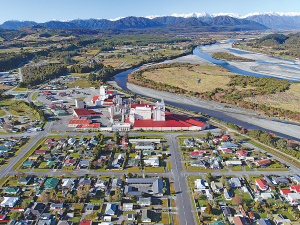Strong growth for Yili's NZ operations
Chinese dairy giant Yili Group says its New Zealand operations are on track for strong revenue growth in 2025 after recording significant year-on-year growth for the first half of the year.
 Westland Milk recently did a carbon footprint assessment of their plant in Hokitika whichs shows emissions have reduced since the last report in 2017-18.
Westland Milk recently did a carbon footprint assessment of their plant in Hokitika whichs shows emissions have reduced since the last report in 2017-18.
Setting a regulation in place often disengages certain people rather than appealing to their motivation to act.
That's the view of Olivia Berry, head of strategy and sustainability at Yili/Westland Milk Products, who recently attended the Agricultural Climate Change conference. She says one of the lessons from the conference was to find the best way to incentivise farmers to deal with agricultural emissions and other environment-related matters.
She says the message came through that farmers should be allowed to do what was necessary, with support through tools and new information.
She says Westland Milk recently did a carbon footprint assessment of their plant in Hokitika which shows emissions have reduced since the last report in 2017-18.
"The draft version of that report is showing a 19% reduction in our carbon dioxide emissions, which is pretty exciting."
Westlnd also reduced coal use by 20% in the past seasn compared with the previous season - equivalent to 11,000 tonnes of coal not burned, she says.
Berry says Westland also reduced energy consumption by 22% "across the board", a lot of which was done in conjunction with the Government Investment in Decarbonising Industry (GIDI) Fund.
She says they have done process heat reduction programmes and changed the way the company moves milk around the country.
"That's been about working with transport companies on improving efficiency on moving product from our Hokitika plant across to Christchurch and then overseas," she says.
Up until now it has focused mainly on reducing emissions at its factory but it has done some limited work with its farmers.
Berry says all their supplier farmer now have their greenhouse gas emissions reports and Westland's own farm excellence programme talks about reducing emissions.
She says their company is now developing focus farms and keeping a watching brief on the likes of what Fonterra and the other dairy companies are doing in regenerative agriculture. She says key to this is looking at what we mean by regenerative agriculture from an NZ perspective.
"We talk about improving biodiversity on farm and the question often asked is, what does this mean to a farm that already has a very high level of biodiversity and is there a need to keep continuing increasing that?"
Berry says farmers who are already doing a good job in this area need to be rewarded.
OPINION: The year has started positively for New Zealand dairy farmers and things are likely to get better.
Ministry for Primary Industries (MPI) Director General Ray Smith believes there is potential for an increase in dairy farming in New Zealand.
New Zealand's new Special Agricultural Trade Envoy, Horowhenua dairy farmer, company director and former Minister of Agriculture, Nathan Guy says the Free Trade Agreement (FTA) with India is a good deal for the country.
New figures show dairy farmers are not only holding on to their international workforce, but are also supporting those staff to step into higher-skilled roles on farm.
New tractor deliveries for 2025 jumped 10% compared to the previous year, a reflection of the positive primary sector outlook, according to the Tractor and Machinery Association (TAMA).
Entries have opened for two awards in the New Zealand Dairy Industry Awards (NZDIA) programme, aimed at helping young farmers progress to farm ownership.